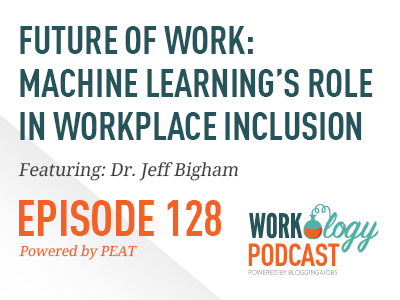The economy is strong and there is an assumption that everyone who wants to find work can be gainfully employed quickly and easily. However, a 2015 study by the Annual Disability Statistics Compendium reported that while employment for people without disabilities is 75.4%, the employment rate for people with disabilities is at 34.4%. Crowd work also known as the gig economy could be the answer to providing people with disabilities an opportunity to generate income providing them flexibility.
As part of our Future of Work series in partnership with PEAT, we wanted to explore more about technology specifically machine learning and how it is providing work opportunities for adults with disabilities.
Episode 128: Machine Learning’s Role in Workplace Inclusion with Jeff Bigham (@jeffbigham)
Dr. Jeff Bigham is an associate professor at Carnegie Melon University. He has a wealth of knowledge and research on accessibility for the gig economy. Jeff started working in artificial intelligence and became frustrated with how technology doesn’t always get things right like closed captioning for people with visual impairments. He began using started freelance marketplaces to supplement close captioned machine learning.
For example, the transcript of this podcast is generated using a machine learning tool called Sonix. However, the podcast transcript from the technology isn’t perfect. There are errors, misspellings, and other mistakes that have to be checked, corrected, and updated by a human being. Jeff saw potential in these kinds of crowd work platforms to not only supplement technology but as a way for people with disabilities to generate income and work. Jeff explains that platforms like Mechanical Turk pay by the small project allowing gig workers to complete small tasks like an audio transcript, entering in information into a spreadsheet or organizing data. He says that these are real opportunities for people with disabilities to generate income, work from home, and have the flexibility that fits their lives and schedules.
Who Is Responsible to Skill Up Our Gig Economy?
Companies are certainly concerned about employment and developing their workforce. It’s a conversation I’m exploring more as part of a larger panel discussion at the HRetreat at SXSW I’m hosting next week. With the rise of the gig economy, Jeff talks us through the importance of supporting and providing our gig workers with opportunities to grow their skill sets and experiences. We want to work with people especially those in the gig economy who get the job done, collaborate well, and are reliable and responsible. While we might not be able to provide funds to pay for new training for our best contract workers directly, we can encourage them and have frank discussions about the type of future projects and ways their work could expand. These gig workers might not have the support of a mentor or the guidance of someone like you would internally at a larger organization which is where our responsibility really lies.
Another challenge beyond upscaling skills is in the law. While the gig economy has grown, laws like the Americans with Disabilities Act aren’t designed to provide accommodation to gig workers to complete these small tasks. The law has yet to catch up with to the new workplace. So until then, we have to rely on organizations to offer accommodations on their own and/or design contract work or crowd work programs to hire people with disabilities.
Jeff’s research covers a wide range. I’ve included some of his published work below including his work with voice technology like Alexa and Google Home as a way for hearing impaired can use speech-controlled devices. As IOT technology continues to grow in popularity, employers of traditional permanent workers and crowd workers need to consider how this new tech impacts the entire employee and contractor population.
Workplace Inclusion Comes In All Forms
Inclusion comes in all forms and I’m inspired by the research by Jeff as well as the technology that supports these efforts. As the gig economy continues to grow and the talent war becomes more competitive, companies need to look beyond the traditional way of hiring, recruiting and employment for all types of individuals.
Connect with Jeff Bigham on LinkedIn by clicking here.
RECOMMENDED RESOURCES
-
- Subcontracting Microwork ~ Published Research by Jeff
How to Subscribe to the Workology Podcast
You can also click here to find out how to be a guest on the Workology Podcast.









